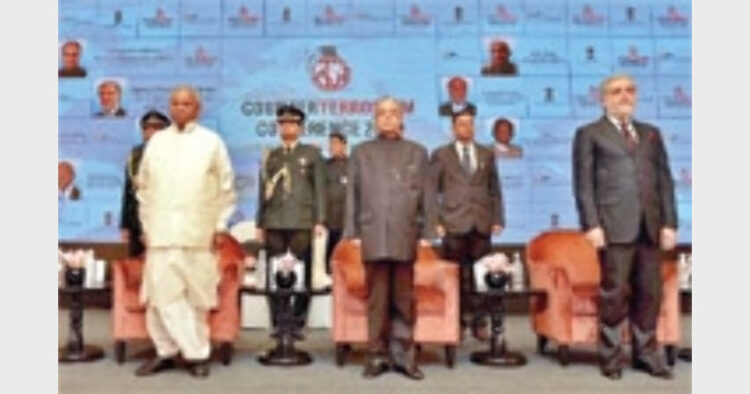Two-day conference by India Foundation in Jaipur to discuss terrorism as a global threat, which poses an unprecedented challenge to all nations
When efficacy of think tanks in Bharat is discussed, a think tank brought together field operatives, senior officials from security agencies, policy makers, scholars and government leaders involved in counterterrorism operations, planning and sensitisation from more than 25 countries. No wonder President of Bharat himself set the ball rolling for the deliberations in the inaugural session along with Chief Executive of Afghanistan Dr Abdullah Abdullah as a keynote speaker. And the sessions had special addresses by Foreign Secretary S Jaishankar, State Foreign Minister of Bangladesh Shahriar Alam, pre-dinner interaction guided by Deputy Foreign Minister of Iran Ibrahim Rahimpour and National Security Advisor (NSA) Ajit Doval and panel discussions guided by authorities on terror outfits from across the continents, workshops conducted by specialist having hands on experience and all this was attended by more than 250 informed audience. The occasion was a two days conference organised by India Foundation in collaboration with the Government of Rajasthan at Hotel Crowne Plaza of Pink City Jaipur. The focus of second edition of this Counter Terrorism Conference was ‘tackling global terror outfits’ with special emphasise on understanding the phenomenon of the mushrooming terror outfits in the West Asia and its neighbourhood, their methodology, motivation and resources.
All countries around the world accept beyond doubt that terrorism is the single gravest threat whole humanity is facing today. Still, there is no commonly accepted definition of terrorism and no universally accepted Counter Terrorism strategy. As the NSA of Bharat Ajit Doval reminded, since the beginning of ‘war on terror’ after the attack on WTC in the US, there is a rise of 320 per cent in terrorist violence. What have we achieved through this war certainly needs critical deliberation. On this background, a call given by the President to resolve not to justify terrorist means whatever is the reason or the source, is significant one. Presentation by Foreign Secretary S Jaishankar with diplomatic finesse pointed out that somebody’s terrorist is no longer somebody else’s freedom fighter. His free and frank answers to the questions raised by audience with candid acceptance that we are in touch with Pakistani counterparts on the issue of terrorism was definitely heartening for everyone. A single statement by foreign secretary that bad guys are thinking global while good guys are still thinking
national, rationalised the purpose of this conference.
What was more promising was the fact that right from Dr Abdullah of Afghanistan and Ibrahim Rahimpour of Iran to minister from Malaysia and scholars from Afghanistan, unequivocally denounced the concept of ‘good terrorist, bad terrorist’. From all quarters there was a realisation that terrorism no longer has national or regional character and globally they are creating the same menace. This realisation strengthens the call given by Bharat for Comprehensive Convention on International Terrorism. This conference has certainly provided impetus in that direction.
Panel discussion on The Caliphate, al-Qaeda and global jihad with spotlight on religious and theological underpinnings drew special acclamation. While scholars like M J Akbar, Sultan Shahin and Lt Gen Ata Hasnain unfolded the psychological turbulence in the Muslims minds and world, Dr Daniel Pipes and Dr Alexander Evans provided a Western view point on the same.
Three workshops on the first day Technology, Social Media and Terror, Terror Infrastructure and Financing and Terror Networks- Cooperation and Rivalries were a real feast for participants. Uri Ben Yaakov from The International Institute for Counter-Terrorism of Israel completely dissected the terror financing networks where he pointed out that in a recent trend with hybrid jihadi networks funding is directly provided to the end users to the end users. Direct control of terrorist organisations on natural resources and control over populations have made their task easy. This phenomenon along with tactical use of technology has made the task of intelligence and security agencies all the more difficult was the common voice echoed in this workshop. This again underscored the necessity of such conference with larger goal of sharing not only intelligence but each other’s experience. A detailed account presented by Admiral Jayanath Colombage, former naval chief of Sri Lanka, on his first hand experience about war against LTTE was fascinating in this regard.
The presence of Home Minister Rajnath Singh in the valedictory session was icing on the cake where he craftily articulated counter-terrorism strategy of Bharat. While stating the obvious that ‘most of the terrorist attacks in India emanate from Pakistan’, his assurance that Bharat will stand by Pak if it takes decisive action against terrorists and terrorist organisations brought a ray of hope for the South Asian participants.
During presentations and discussion, Pakistan was apparently the most referred country which was unfortunately missing in participation. Even after extending formal invitations to couple of scholars they could not make it to the event due to personal or technical reasons. It is beyond doubt that Pakistan’s participation would
have added substance and colour to this rigorous brainstorming on
counter terrorism.
—Organiser Bureau














Comments